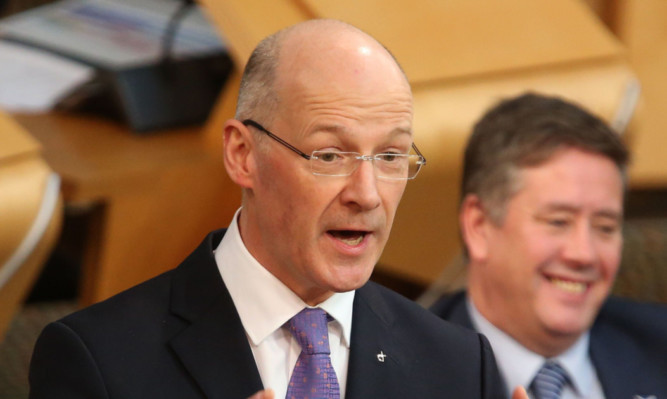John Swinney has delivered a tax break for middle earners with cuts to his stamp duty replacement scheme.
The deputy first minister and finance secretary insisted changes to the new property tax would make 90% of Scots better off than they would be under the system for the rest of the UK.
Mr Swinney revealed details of the Land and Buildings Transaction Tax (LBTT) last October, but announced new changes after Chancellor George Osborne unveiled a series of his own alterations in the Autumn Statement.
An extra band has now been added in an attempt to tackle what the Scottish Conservatives had called “tax on aspiration”.
From April, residential properties worth up to £145,000 will not attract any tax, while a rate of 2% will be applied on sales between £145,000 and £250,000, with the new rate at 5% between £250,000 and £325,000.
Mr Swinney had previously planned a tax rate of 10% on homes sold for between £250,000 and £1 million, prompting fears those buying family homes could be hit.
Now that band will apply to properties valued between £325,000 and £750,000, with the top rate of 12% taking effect from £750,000.
Mr Swinney accused the Chancellor of replicating the design of LBTT before adding the money freed up by the Treasury’s changed allowed him to introduce more tax breaks while keeping the policy revenue neutral.
He said: “As a result of my announcement today more than 90,000 taxpayers nine out of 10 taxpayers will be better or no worse off under the Scottish system than under UK stamp duty land tax.”
He also claimed that “all those buying a residential property in Scotland for £330,000 or less will pay up to £400 less tax under LBTT, or will pay no tax at all”, adding that only those buying a home for more than £945,000 would pay more as a result of the changes.
Mr Swinney also outlined spending plans for the NHS, to mitigate the “bedroom tax”, investment in more affordable homes and energy efficiency.
Conservative finance spokesman Gavin Brown praised Mr Swinney for being in “listening mode” and hailed what he described as a tax cut of around £64 million in relation to the LBTT rates set out last year.
Meanwhile, Labour called on the Scottish Government to set up an NHS “frontline fund” to enable the health service to move to a seven day a week operation.
The additional £100 million needed would be found in Barnett consequentials, the party argued.
